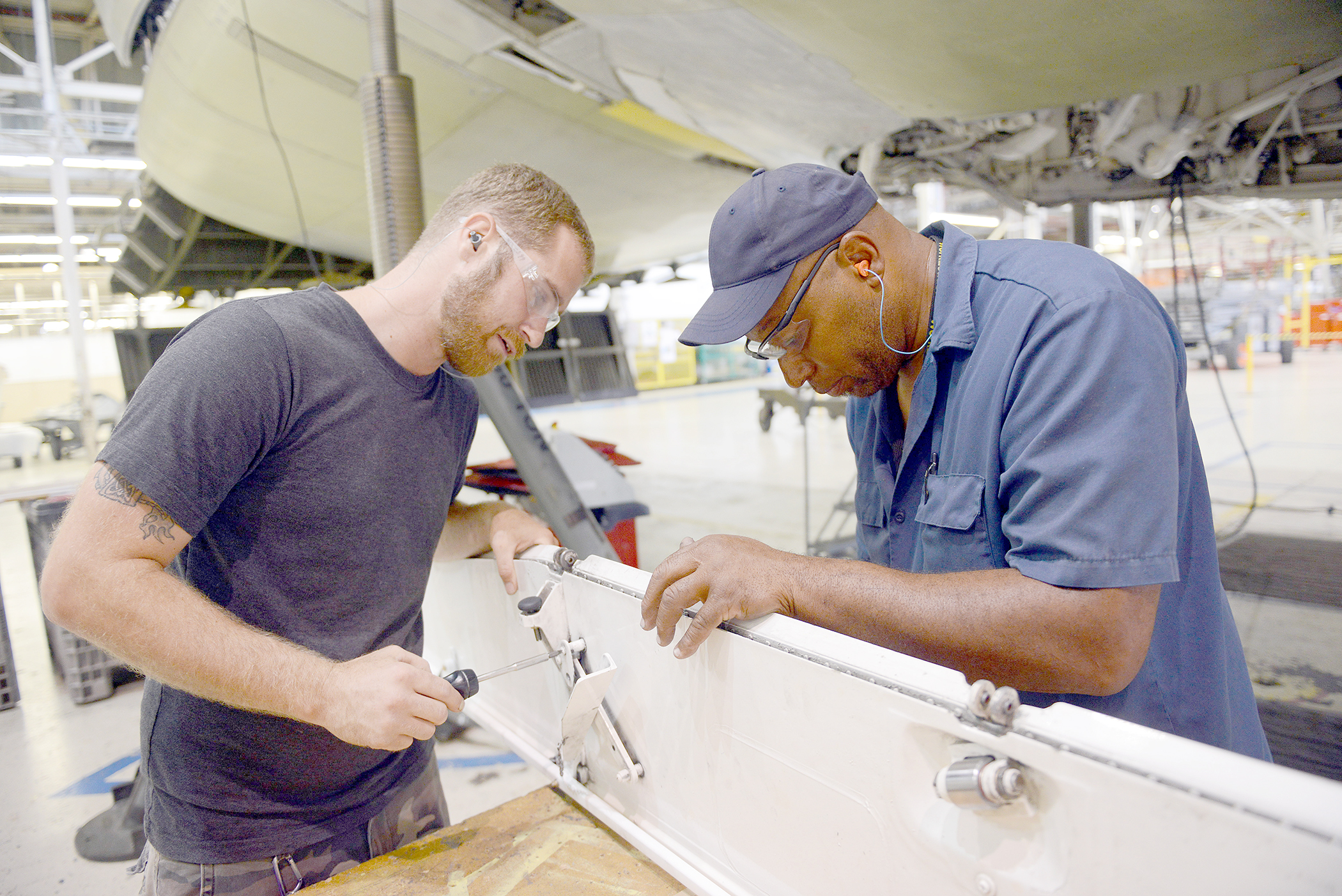Eric Acree (left), 569th Aircraft Maintenance Squadron aircraft mechanic, and Mike Webb, hydraulic work lead, repair a C-5 bulkhead at the Warner Robins Air Logistics Complex in Georgia. Air Force photo by Tommie Horton.
A little-noticed provision in the sprawling Pentagon policy bill could give the Air Force a big boost in its readiness rates. The language would allow the service to more quickly hire mechanics and other civilian personnel at its three major aircraft maintenance facilities.
The provision, tucked deep into the 3,076-page law, allows the Defense Department to circumvent the government’s long and often tedious hiring processes. DOD would have direct-authority through the end of Fiscal 2018 to recruit personnel much more quickly at military depots, arsenals, and shipyards around the country.
For the Air Force, this could allow the service to keep up with an anticipated uptick in depot-maintenance hours at its three air logistics complexes—Ogden in Utah, Oklahoma City, and Warner Robins in Georgia—as the service watches its overall fleet age rise as it simultaneously populates its inventory with new F-35 Joint Strike Fighters, KC-46 aerial refueling tankers, and other acquisitions.
Air Force officials have expressed concerns about the slow hiring processes and its effects on attracting skilled workers to their depots, particularly at Ogden and Warner Robins, according to a February Government Accountability Office (GAO) report.
While the depots can use overtime hours to keep up with the current workload, which has fluctuated at the three facilities since 2012, all could most certainly use the extra personnel as newer systems come in for maintenance and repairs on some of the service’s most complex equipment.
Indeed, Warner Robins’ future workload includes aviation electronics for the KC-46, F-35, F-22 fighter, and MQ-9 Reaper remotely piloted aircraft.
Its workforce, however, was reduced from 8,500 civilian personnel to 7,200 between Fiscal 2012 and 2015, thanks (in part) to cutbacks due to budget caps.
While automated processes may allow Warner Robins to limit the growth of personnel, the facility still has hundreds of personnel it would like to hire to maintain cargo and fighter aircraft there.
Oklahoma City, meanwhile, will soon be tasked with repairs on the KC-46, as well as engine work for the tanker, MQ-9, and RQ-4 Global Hawk—though officials there told GAO they have a relatively easy time filling slots thanks to a recruiting-rich environment.
At Ogden, which will work on the Ground-Based Strategic Deterrent System and the T-X trainer aircraft, the biggest personnel shortage is in software maintenance.
At his June 2016 confirmation hearing before the Senate Armed Services Committee, Air Force Chief of Staff Gen. David L. Goldfein counted weapons systems sustainment second on his list of five key elements that the service must keep in balance, underscoring the importance of depot health to the service’s overall readiness.
“I’d like to, if I can, highlight the magicians in our depots,” Goldfein added later. “Quite frankly, there’s only one reason we have aircraft still flying after 50 years. It’s because of the quality of individuals we have at our depots that keep them flying.”
While maintaining and expanding the skilled work forces at the Air Force depots has the support of senior service and Pentagon leaders, the implementation of the new provision hit a snag just a month after then-President Barack Obama signed the defense bill into law.
Just days after his inauguration, President Donald Trump signed a memorandum temporarily freezing federal civilian employees, making good on a pledge he repeatedly made during the campaign to reduce the size and cost of the government. Initially, the freeze applied to all employees, including those at USAF’s depots.
A week later, the Pentagon issued a long list of jobs exempt from the freeze, including those at the military depots.
That paves the way for the Air Force to seize on the new direct-hire authority to hire hundreds of new personnel, including potentially 343 aircraft maintainers at Warner Robins who could benefit from the provision in the defense bill.
But the freeze could still slow efforts to recruit and quickly hire new workers at the depots.
In a Feb. 1 memo to Pentagon officials, Deputy Defense Secretary Robert O. Work instructed the Defense Department to apply the exemptions “sparingly,” justify them on a “position-by-positon basis,” and submit biweekly reports to the Pentagon personnel chief.
“This is an opportunity for the Department to assess its most critical missions and requirements, ensuring that the civilian component of our force is assigned and capable of executing our highest priority work, while at the same time gaining full value from every taxpayer dollar we spend on defense,” wrote Work, a holdover from the Obama Administration.
